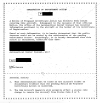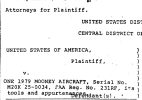Mtns2SkiesBetterHalf
Pre-Flight
- Joined
- Apr 27, 2017
- Messages
- 31
- Display Name
Display name:
Mtns2SkiesBetterHalf
I'm looking at the aircraft registration CD for a plane I might buy and noticed something I hadn't seen before. It is a "Termination of Enforcement Action" letter assigned to that tail number.
The letter seems to indicate that the enforcement action could be against the aircraft or the owner but doesn't specify which or what it was. There's nothing else in the registration files about it.
Anybody seen this before?

The letter seems to indicate that the enforcement action could be against the aircraft or the owner but doesn't specify which or what it was. There's nothing else in the registration files about it.
Anybody seen this before?



 )
)